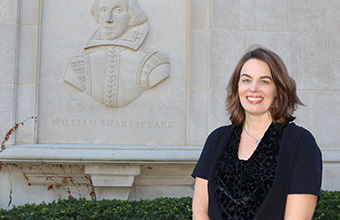College of Arts and Sciences Newsroom

Humanities Visibility
University of Dayton humanities faculty and students have a new champion in Marissa McCray '00, a staff member and alumna working to highlight the visibility and value of the College of Arts and Sciences’ humanities degrees.
McCray, who joined the University staff in 2015 as the part-time Core program coordinator, recently had her role expanded into a newly created full-time position, the Core and humanities visibility coordinator.
This larger role supports a key pillar of the University’s strategic vision involving the integration of the arts and humanities, which play an essential role in the development of creative and critical thinking and forward-thinking leadership.
McCray is charged with recruiting more humanities students, increasing the visibility of humanities majors on campus and linking the skills those majors provide — communication, teamwork, adaptability, problem-solving, critical observation and leadership — to those sought by employers.
“The goal is to create more awareness about the humanities on campus, and to help provide an identity for our students who are humanities majors or who are interested in becoming a humanities major,” McCray said.
The College’s humanities disciplines include the Departments of English, Global Languages and Cultures, History, Philosophy and Religious Studies, as well as the Core and Women’s and Gender Studies programs.
“At the heart of the humanities is the question of what it means to be human,” said Bill Trollinger, professor of history and Core program director. “We grapple with that in all the humanities disciplines.”
McCray is working with faculty and a student organization, the Humanities Visibility Project, to develop campus activities such as the second annual Humanities Fest at 4-7 p.m. Friday, Oct. 26, at Humanities Plaza.
She will collaborate with academic departments and University Career Services to develop internship opportunities and other professional experiences for humanities majors.
McCray also will continue her work supporting student recruitment, retention and success in the Core program — a challenging two-and-a-half-year curriculum that stresses connections between academic disciplines. Courses center around a common theme, “Human Values in a Pluralistic Culture,” and fulfill many of the University’s Common Academic program requirements.
McCray’s expanded role resulted in part from her success growing the Core program. She brings a wealth of experience for supporting students who are passionate about their humanities education, said Danielle Poe, associate dean for curriculum and academic outcomes.
“While students who major in the humanities have comparable success after graduation to those in the professional schools, many of our students and their parents believe that businesses will not hire them and they'll never find a fulfilling career,” Poe said.
“Because of her work with the Core program, which provides a humanities foundation for all students whether they continue with a humanities major or a professional degree, Marissa understands the ways in which the humanities teaches students oral and written communication skills, the ability to understand and appreciate diverse world views, and the mental flexibility to learn new skill sets in an ever-changing world,” Poe said. “By communicating these skills, Marissa can help students and parents to embrace the humanities as viable majors that will lead students to career success and the fulfillment of their vocation.”
Trollinger noted that 40 percent of the College’s 2018 first-year class is enrolled in the Discover Arts and Discover Sciences programs, which allow students to explore the College’s academic programs before finalizing a major. Nearly three-quarters of that cohort are Discover Arts students.
“Many of those students end up having an attraction to the humanities,” Trollinger said. “Part of this is reaching out to them to say: ‘Hey, we have something here. We deal with critical thinking, we deal with texts and this is where you might want to be.’”
McCray holds a bachelor’s degree in communication from the University and will write stories about the humanities and Core program for the College Newsroom blog. She also will manage Core and humanities-related social media channels.
McCray expects to receive her master’s degree in higher education administration from the University in May 2019.
- Dave Larsen, communication coordinator, College of Arts and Sciences
